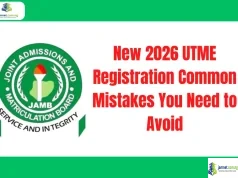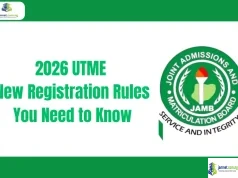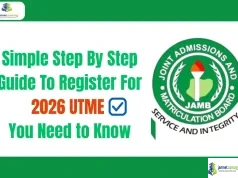A detailed comparison of the GMAT and GRE, helping international students decide which Graduate test is best for their graduate school applications


Applying to study abroad can be an incredibly stressful process, encompassing everything from writing compelling essays and securing letters of recommendation to meeting strict scholarship deadlines.

Join our Telegram Channel for Instant Scholarship Updates
The last thing a student needs on top of all that pressure is uncertainty regarding which standardized test to take: the GMAT or the GRE. Many students make this critical decision without conducting adequate research, and regrettably, it can have negative consequences in the long term. Choosing the correct examination is especially crucial if you are aiming for a graduate degree, particularly a Master of Business Administration (MBA). If you’re still considering your options, you might find this list of the top 10 reasons to study your master’s abroad helpful.
Selecting the appropriate exam is not merely about achieving a high score; it is about aligning your inherent strengths with your professional aspirations and giving yourself the best possible chance for admission.
In this extensive guide, we will provide a clear breakdown of the GMAT and GRE in simple terms. By the conclusion, you will understand the fundamental differences in their format, eligibility criteria, and acceptance, and, more importantly, you will be able to determine which test is more suited to your particular strengths. For a deeper dive into whether you need the GRE at all, check out this guide on do you require the GRE to study abroad.
What is the GMAT?
The Graduate Management Admission Test, commonly known as the GMAT, is an examination designed specifically for entrance into business and management degrees, such as an MBA. Administered by the Graduate Management Admission Council (GMAC), this examination measures abilities in quantitative reasoning, verbal reasoning, data insights, and analytical writing, all of which are essential for success in graduate-level business programs. The most recent version of the test, known as the GMAT Focus Edition, has been streamlined to better assess the skills most relevant to today’s business school curricula.
One significant benefit of the GMAT is its widespread acceptance among global business schools. If you are certain that you want to attend a graduate business school, you should consider the GMAT as a primary option. However, it is important to know that this test is significantly focused on mathematics and data analysis. If you find that numbers and logical reasoning are not your strongest suits, this could potentially impact your performance. The test’s structure, particularly its Data Insights section, requires candidates to demonstrate their ability to interpret and analyze complex data from various sources, a skill that is highly valued in the business world.
What is the GRE?
The Graduate Record Examination (GRE), which is administered by the Educational Testing Service, is much broader in its scope. Unlike the GMAT, its use is not limited to business; it is accepted by a wide array of graduate schools for programs in law, engineering, the social sciences, and even some MBA programs. The GRE assesses verbal reasoning, quantitative reasoning, and analytical writing skills.
The GRE is highly recommended due to its inherent flexibility, making it an excellent choice if you are exploring options beyond business school or are considering a dual-degree program that includes a non-business component. However, when applying to study abroad, you must not choose the GRE without first verifying whether your preferred MBA program actually accepts it and whether they show a preference for one test over the other.
While both examinations evaluate verbal and quantitative reasoning, the GMAT places a greater emphasis on advanced problem-solving and data interpretation, while the GRE places a greater emphasis on a wide-ranging vocabulary and general reading comprehension. Therefore, understanding the key differences between them is crucial for making an informed choice, which will be detailed in the following section. For those exploring other regions, you might also find this guide on the 10 best universities in Australia for international students helpful.
GMAT vs GRE: Key Differences
While both examinations evaluate reasoning and problem-solving, the GMAT emphasizes data analysis and logical deduction, while the GRE leans more on vocabulary and general reading comprehension. The tables below provide a clear and direct comparison.
| Aspect | GMAT | GRE |
|---|---|---|
| Purpose | This test is designed exclusively for business schools and MBA programs. It is seen as a predictive tool for success in a management curriculum. | It has a broader use and is accepted for graduate programs in numerous fields, including business, law, and sciences. It serves as a more general measure of graduate-level readiness. |
| Test Duration | The GMAT Focus Edition is approximately 2 hours and 15 minutes long. It is a shorter test, but the questions can be very demanding and require intense focus. | The GRE is approximately 1 hour and 58 minutes long. Its shorter length makes it a less strenuous experience for many test takers. |
| Structure | It has a modular format with three sections that you can take in any order: Quantitative Reasoning, Verbal Reasoning, and Data Insights. This flexibility allows test takers to begin with their strongest section. | It has a fixed order with three sections: Analytical Writing, Verbal Reasoning, and Quantitative Reasoning. This consistent format is easy to prepare for and follow. |
| Scoring System | The total score ranges from 205 to 805, with section scores ranging from 60 to 90. The score is a combination of performance on all three sections. | The combined total score is between 260 and 340, with Verbal and Quantitative sections scored from 130 to 170 each, plus a separate Writing score from 0 to 6. |
| Cost | The cost is around $275 at a test center and $300 for the online version. These fees may vary slightly depending on your region. | The cost is approximately $220, though this also varies slightly by region. It is generally a more affordable option for students. |
| Score Validity | The scores are valid for 5 years from the date of the test. | The scores are also valid for 5 years from the date of the test. |
| Results Release | Unofficial scores for the quantitative and verbal sections are available immediately. The official score report is typically released within 3 to 5 business days. | Unofficial scores for the verbal and quantitative sections are also available immediately. The official score report is usually available 8 to 10 days after the test. |
| Adaptivity | The test is question-level adaptive. This means that every correct or incorrect answer directly influences the difficulty of the very next question. This requires a high level of concentration throughout the exam. | The test is section-level adaptive. Your performance in the first section sets the difficulty for the next one, which provides a more consistent experience within each section. |
| Essay Requirement | There is no essay in the GMAT Focus Edition, although some schools may require a separate Business Writing Assessment. | It still requires a 30-minute Analytical Writing essay. This is a crucial component for demonstrating your critical thinking and writing abilities. |
| Math Style | The Quantitative Reasoning section includes Data Sufficiency questions, which are unique and focus on logical deduction. It requires a deeper level of abstract problem-solving. | The Quantitative Reasoning section includes Quantitative Comparison questions, which focus on comparing two values. The questions are more direct and problem-solving focused. |
| Unique Section | Data Insights is a new section that tests your ability to interpret multi-source data. This skill is highly relevant to business management. | The GRE does not have a dedicated data section; data interpretation is integrated into the quantitative part of the exam. |
| Verbal Focus | The Verbal section primarily tests grammar and reasoning through sentence correction, critical reasoning, and reading comprehension. It is less about obscure vocabulary and more about logical structure. | The Verbal section focuses on vocabulary and usage, with questions on text completion, sentence equivalence, and reading comprehension. A strong vocabulary is a key to success. |
| Acceptance | It is the gold standard for business schools and is widely accepted by more than 2,300 business programs globally. | It is accepted by many graduate schools, especially for programs in STEM, humanities, law, and liberal arts, though fewer MBA programs accept it compared to the GMAT. |
GMAT vs GRE: Which is Right for You?
Now you are faced with a crucial question: which one should you take? If you are 100% committed to pursuing an MBA or a career in business, the GMAT may serve you best. It is specifically designed for management programs and is still the preferred choice for many top business schools. Choosing the GMAT demonstrates a clear focus on a business-related career path.
On the other hand, if you desire flexibility, especially if you are considering a dual degree or a program outside of business, the GRE provides you with a broader range of options. It is also an ideal choice if you feel that your skills are stronger in vocabulary and analytical writing rather than in intensive quantitative reasoning.
If you are uncertain about which one to choose, you should take practice tests for both examinations. This experience will allow you to become familiar with the format of each test and can help you select the one that best matches your strengths. This strategy will help you avoid the mistake of committing to the wrong test. A good plan is to take one practice test for each exam.
Afterward, analyze your performance. Did you find the GMAT’s Data Insights section intuitive? Did you feel more comfortable with the GRE’s verbal reasoning? Your familiarity and comfort with the format can be an excellent guide. You can also review these top 10 questions to help you decide if studying abroad is right for you.
Is GMAT or GRE Required for Scholarships?
Beyond admissions, both the GMAT and GRE can significantly boost your scholarship chances. Many universities and graduate programs consider these test scores when awarding merit-based aid, and higher scores can substantially increase your opportunities for financial support. In fact, some schools even use test results to create a shortlist of candidates for fully funded awards. When you are applying, you should not ignore the impact of test scores on financial aid. Therefore, even if your program does not explicitly require a test, having a strong GMAT or GRE score can set you apart and make your application much more competitive. For more on this, check out this guide on how to apply for scholarships successfully.
How to Prepare for a GMAT/GRE Test
No matter which examination you choose, thorough preparation is essential. Here are some tips and strategies that can help you prepare for these standardized tests:
- Start with Official Preparation Tools: The best way to begin your preparation is by using official tools. For the GMAT, use resources from MBA.com, and for the GRE, use resources from ETS.org. These tools will provide you with sample questions and practice tests directly from the source, giving you an authentic testing experience.
- Learn the Exam Format Inside Out: Understanding the question types and the timing for each section will help you avoid surprises on test day. Time management is a crucial skill for both exams, so you should always practice with a timer to build stamina and accuracy.
- Create a Study Schedule: Design a realistic study plan that allocates time to each section. For instance, dedicate two to three weeks to building your vocabulary, followed by focused practice on quantitative questions. A structured approach ensures you cover all material without feeling overwhelmed.
- Do Not Procrastinate: Waiting until the last minute will not allow you to perform at your best. Early preparation provides you with the flexibility for retakes if needed, which helps you avoid the mistake of submitting a rushed or weak score with your study-abroad application.
The Step-by-Step Application Process
Navigating the logistics of the test can be a source of anxiety. Here is a clear guide on how to register and what to expect on the day of the exam.
How to Register for the Test: The registration process for both the GMAT and GRE is straightforward and is done online.
- Create an Account: Go to the official website of the test you have chosen (MBA.com for GMAT, ETS.org for GRE) and create an account.
- Select a Test Center and Date: Use the portal to find a test center near you and choose a date and time that works for your schedule.
- Submit Your Information: You will be required to provide personal information and verify your identity.
- Pay the Test Fee: You can pay the test fee online using a credit or debit card. It is important to note that fees may be subject to regional differences.
What to Expect on Test Day:
- Arrival: You must arrive at the test center at least 30 minutes before your scheduled time for check-in.
- Required ID: Bring a valid, government-issued photo identification. The name on your ID must exactly match the name you used during registration.
- Check-in and Security: Your identity will be verified, a photo of you will be taken, and you will be asked to store personal belongings in a locker. You will not be permitted to bring anything into the test room, including phones, watches, or notes.
- Test Environment: You will be assigned a quiet cubicle with a computer. The testing center will provide you with a scratchpad and a pencil for your rough work. You will have a short break during the examination, but you are not allowed to leave the testing center.
Understanding and Reporting Your Scores
After you complete the test, you will have the option to view your unofficial scores for the Verbal Reasoning and Quantitative Reasoning sections. This is your first opportunity to see how you have performed.
Score Select Option: Both the GMAT and GRE offer a “ScoreSelect” option. This allows you to choose which scores you want to send to universities from your test history. This is a significant advantage, as it means that universities will only see your best performance, even if you have taken the test multiple times.
Sending Your Scores:
- Initial Free Reports: On the day of the test, you can select up to four graduate institutions to which you want to send your official scores for free. It is highly recommended to do this before you leave the test center.
- Additional Reports: If you want to send your scores to more than four schools, or if you decide to send them later, you can do so through your online account. However, there will be a fee for each additional score report.
Frequently Asked Questions
1. What is a “good” GMAT or GRE score? A “good” score is subjective and depends heavily on the programs you are targeting. For top-tier business schools, a GMAT score above 700 or a GRE score above 325 is often considered competitive. For other graduate programs, a strong score in the quantitative section is essential for STEM degrees, while a high verbal score is crucial for humanities or social sciences programs. Research the average scores of admitted students for your target programs to set a realistic goal.
2. Can I take the test more than once? Yes, you can. Both exams allow you to retake the test to improve your score. The GMAT can be taken up to five times within a 12-month period and a total of eight times in your lifetime. The GRE can be taken up to five times in any 12-month period. Remember, the ScoreSelect option allows you to send only your best score, so there is no harm in retaking the test if you believe you can improve your performance.
3. How far in advance should I begin studying? Most test-takers recommend starting your preparation at least two to three months before your planned test date. This timeline provides you with sufficient time to familiarize yourself with the format, identify your weak areas, and practice with mock tests. A structured study plan is essential for effective preparation and to avoid last-minute stress.
4. Do top business schools prefer one test over the other? While most top business schools now accept both the GMAT and GRE, some may still have a slight preference for the GMAT, as it is a specialized test for business programs. However, this is changing, and a strong score on either exam will make your application competitive. The key is to take the test that plays to your strengths and allows you to achieve the highest possible score.
Now you understand the best test for you and why it is so necessary. Even if your program does not require it, a strong score can set you apart, strengthen your application, and improve your chances of admission. It is about understanding your strengths, checking your program’s specific requirements, and preparing strategically. Both exams are widely accepted, and both can strengthen your application and scholarship opportunities.













